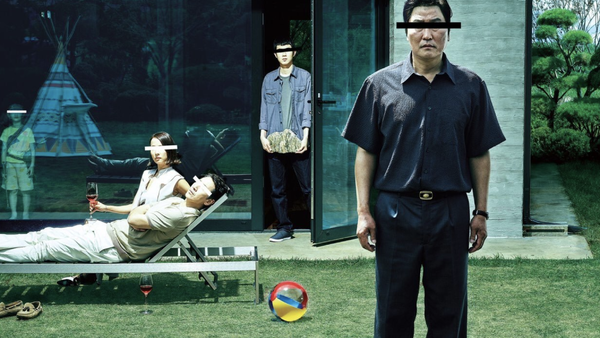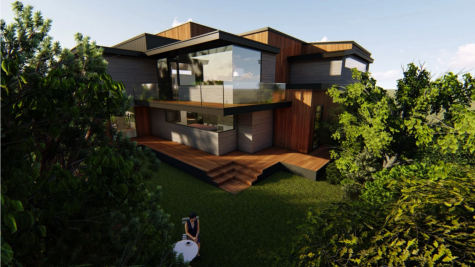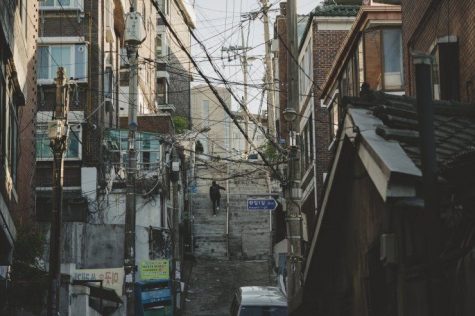Parasite: A Film Beyond the Surface

November 25, 2019
Parasite is a South Korean film directed by renowned director Bong Joon-Ho. Bong is famed for films like Okja, The Host, and SnowPiercer. In late May, the film won the Palme d’Or, the highest prize awarded to international films, at the 2019 Cannes Film Festival, becoming the first Korean film to win this prestigious award.
Bong was originally a sociology major in university, but he soon found himself spending most of his time in film club. Only later on in his education, though, did he go to a film academy in order to professionally learn the art form. His education in university can explain why most of Bong’s films bring up conversations about controversial societal norms and topics. Parasite is an excellent example of one of his works that projects his talent for using cinematic techniques.

Parasite tells the story of the Kims, who deceive their way to getting jobs as workers in the Parks’s household. The job is first introduced to Ki-woo Park through a friend that used to tutor the daughter of the Parks. He pretends to be a college student at a prestigious university when in reality, he has failed to get in three times. Slowly, Ki-woo gets jobs at the Park household for all of his family members, all without telling the Parks that they are related. The plot is set in two main locations: the house of the Kims and the house of the Parks. The Parks live in a gorgeous modernized home that exudes wealth. It is located on the top of a hill, way above the busy streets and civilians. The Kims, on the other hand, live in a half-basement in a dingy neighborhood. The only window in their house is level to the street outside. The settings of the two houses are where we can mainly see Bong’s cinematic techniques come into play. The Parks are higher in the hierarchy of society because of their wealth, while the Kims are at the very bottom. During a scene in which the Kims are forced to run away from the Parks’s home and back to their own, the shots are filmed so that the Kims are continuously going down from the “top of society” which they leeched off of, hence the title Parasite, to the half-basement house at the bottom.
 Bong stated in an interview that he wanted Parasite to be something that kept the audience awake in their beds. This film definitely kept me up at night. Parasite is something that I could watch again and again yet still find endless meanings embedded in scenes. I think the reason why Parasite is so recognized internationally is because of the relatability of the depiction of society. The appeal of the plot is that as the scenes progress, you can feel the tension build. The dialogue is impeccably timed with different elements in the movie, such as Ki-woo’s line first referencing the “pretending” aspect of his friend’s tutoring proposition. During this line, Bong purposely places a bus to pass by the two characters in conversation, symbolizing the change in events. Learning about how everything in Parasite was so meticulously planned and produced after the film and before the film has definitely shaped my different perspectives on it. That’s what I like most about Parasite; it gives the viewer endless interpretations and room to answer his/her own questions by analyzing the film. I plan to watch Parasite one more time. Who knows what Easter eggs and thoughts will be waiting for me in my second viewing?
Bong stated in an interview that he wanted Parasite to be something that kept the audience awake in their beds. This film definitely kept me up at night. Parasite is something that I could watch again and again yet still find endless meanings embedded in scenes. I think the reason why Parasite is so recognized internationally is because of the relatability of the depiction of society. The appeal of the plot is that as the scenes progress, you can feel the tension build. The dialogue is impeccably timed with different elements in the movie, such as Ki-woo’s line first referencing the “pretending” aspect of his friend’s tutoring proposition. During this line, Bong purposely places a bus to pass by the two characters in conversation, symbolizing the change in events. Learning about how everything in Parasite was so meticulously planned and produced after the film and before the film has definitely shaped my different perspectives on it. That’s what I like most about Parasite; it gives the viewer endless interpretations and room to answer his/her own questions by analyzing the film. I plan to watch Parasite one more time. Who knows what Easter eggs and thoughts will be waiting for me in my second viewing?
















































































































































